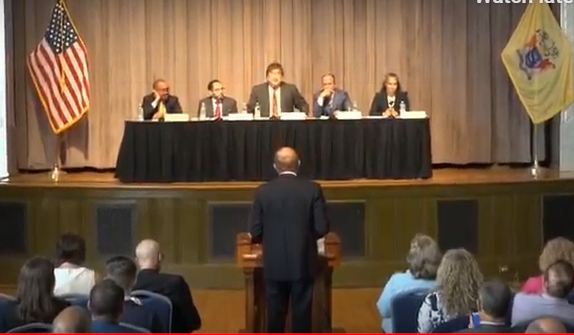The EDA Task Force Final Report: A Troubling Case of Outright Fraud

It's too bad this press conference didn't take place at the Blue Hill Plaza in Pearl River, N.Y.
That business park just over the border from Bergen County really was the "star" of today's final briefing of a task force that spent 18 months looking into state business incentive grants.
What was revealed today was that the Blue Hill Plaza was used time and time again by companies to get millions of dollars in tax incentives by allegedly skirting the rules.
In all, more than $11 million in grants were terminated because of the task force findings. Moreover, the task force said $578 million in grants awarded to 12 companies deserve to be criminally investigated.
The lawyers hosting the conference - Ronald Chen and Jim Walden among them - spoke like attorneys.
Understatement was key.
For instance, Walden observed that the state's Economic Development Authority, which awards grants, failed to display the requisite skepticism in considering applications, Chen, a law professor and task force chair, said, "Some of what we found was troubling."
More bluntly, some of what was found was outright fraud.
As an overall, virtually all states have programs to attract business investment. This is especially vital in a high-tax state like New Jersey.
The grant program under scrutiny came about during the Christie years when a number of other incentive programs were consolidated. An aspect of the incentives discussed today had to do with giving tax credits to companies for staying in New Jersey. This makes sense. If a firm has a chance to move to Texas, but opts to keep its business and jobs in New Jersey, don't they deserve a "thank you" from the state? Most state officials would say yes.
For this program to work properly, a company is supposed to prove to the EDA that it is staying put despite having a suitable out of state location available.
Enter the Blue Hill Plaza.
A task force report released today said that various consultants and brokers working with the EDA encouraged companies to say they were considering a move to the Blue Hill Plaza when that was not the case. This ruse worked 14 times between 2013 and 2019 and at least $130 million in tax incentives were awarded, the report said.
Some of the report findings were either humorous or appalling depending on your mood.
The report quotes a broker writing to a client that the Blue Hill Plaza "has been used as a stalking horse by companies in N.J. who are seeking incentives from the state ... but have no plans on leaving the state."
Well, that sounds pretty clear. Two such companies, Safilo and Lonza America, already had plans for new facilities in New Jersey, but eventually obtained incentive grants after claiming to be considering a move to Blue Hill Plaza, the report said.
EDA employees reportedly joked about what was going on, but that did not stop it.
Walden highlighted one fascinating incident. He said three companies seeking grants all claimed to be interested in moving to the same building and floor at Blue Hill. So, what did the EDA do?
"It approved all three applications," Walden said.
According to the report, operators at Blue Hill sensed all was not on the level. They noted that some company officials coming by to examine office space for an alleged move spent little time at Blue Hill and showed no real interest in what they saw.
In seeking to explain why all this was going on, task force members said the EDA, which theoretically is supposed to protect state interests, saw applicants as "customers" and looked for ways to award tax credits.
It's easy to see why. For Governor Chris Christie, improving the state's business climate was a big deal. What better way to do that than to make sure companies stay here? Moreover, being "friendly" to business is standard Republican philosophy.
As was pointed out today by the task force, "The EDA got the message."
Politics, of course, cuts both ways. When Gov. Phil Murphy created the task force, he was mindful that many controversial tax credits went to Camden County businesses associated with George Norcross, a political opponent. So, the task force was a way to highlight that.
Let's not forget that the state Senate, which is much friendlier to Norcross, created its own committee to review the tax incentive program.
The Murphy review is now complete and it's debatable what will come next.
Walden noted that some companies - even those who may have violated the rules a bit - still cooperated with the task force review. But not all of them.
That led Walden to predict that assuming a criminal review does take place, the companies that cooperated will be better off in the long run.





